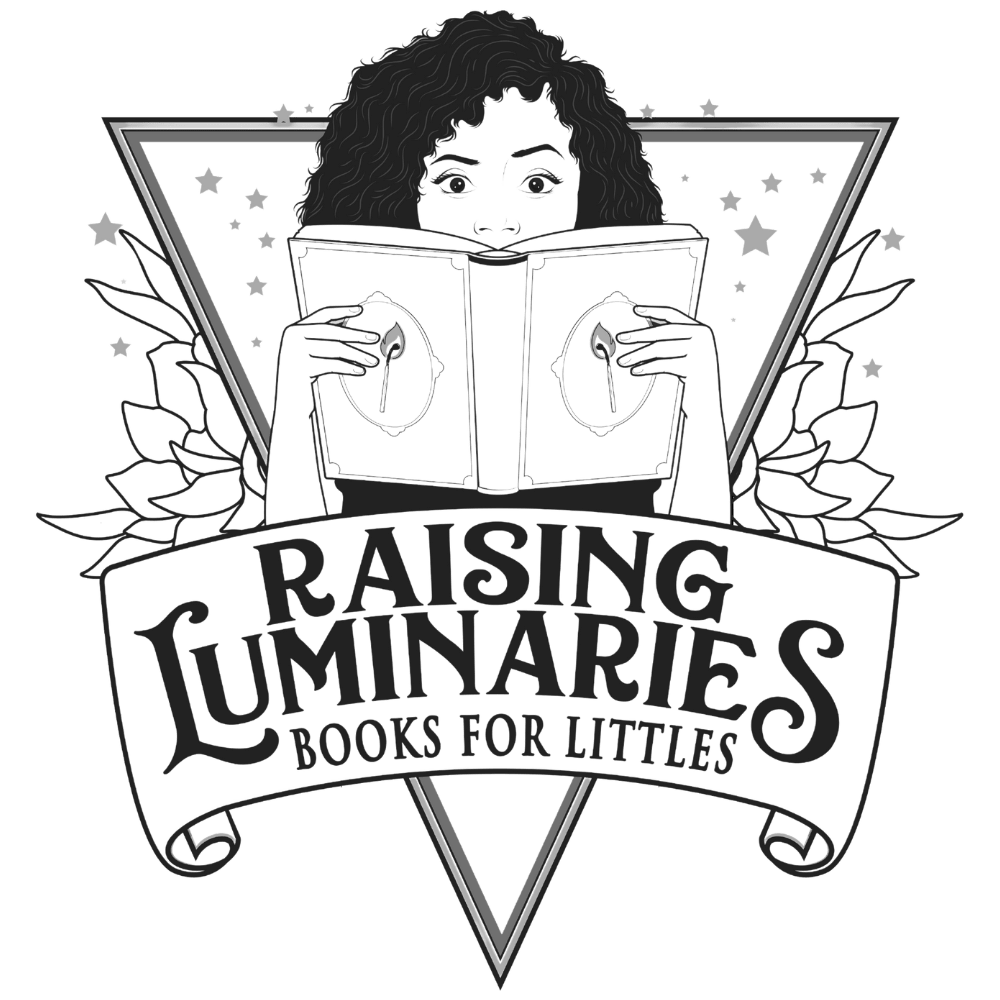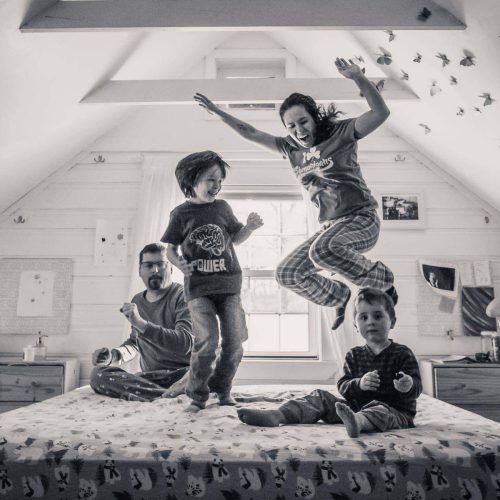Get monthly email updates when I add new resources to our Family Action Toolkits
Believing #OwnVoices Elders
[Image description: Illustration from ‘It Feels Like Snow’ by Nancy Cote. A white-haired white woman holds up her foot in pain while the two white women she’s speaking to double over laughing, pointing, whispering, and pointing at the first woman.]
This season, we’re exploring anti-elder ageism, and how to center the voices of targeted people
This article & book list is a part of the anti-elder ageism series. Start from the beginning: Why Young Activists Depend on the Fight for Elder Rights.
Cultivating humility & curiosity in young kids
‘It Feels Like Snow’ is the perfect book to introduce the importance of listening to #OwnVoices – people with a lifetime of lived experience.
We’re starting with this book because this story builds a foundation of humility and curiosity that we’ll need to raise kind and brilliant kyriarchy smashers.
Here’s why.
Why we must listen to self-advocates with lived experience
Systemic oppression is self-sustaining. We erase, ignore, and target marginalized people because we presume that those who are below us must be there for a good reason.
They must not be as smart, capable, or hard-working as us. They don’t know what they’re talking about. They’re not trying. They don’t know any better. When we silence marginalized voices, we ensure they remain powerless. When we talk about them, without them – listening to caregivers, experts, and advocates without lived experience, we perpetuate a cycle of pity, paternalism and saviorism.
So the first step in breaking that cycle is listening to #OwnVoices activists, authors, self-advocates, and, well, everyday people who live within the identities targeted by the -ism at hand.
It’s kind of hard to get into a position of authority and visibility when you’re just struggling for equality.
These voices can be hard to find.
I’ve found the internet a powerful tool to find #OwnVoices. However – the interwebs are a double-edged sword.
The internet has made us…sloppy in vetting our resources. It’s made us impatient for all but the shiniest of outrageous, viral articles. It’s overwhelming and full of fluff. We have no attention to spare for voices that demand our patience and effort. Those sources beyond the first page of Google.
The internet isn’t set apart from a supremacist culture, it’s a part of it. Which means those first sources you come across about ageism are written by young & middle-aged adults for mainstream blog sites, centering the experience of non-elder adults and the corporations that profit off ageism. Like a dog eating its own vomit, we just reinforce stereotypes and bias that benefits those in power.
Well, actually. No. Talking about ageism, let’s admit the internet is a triple-edged sword. Is that a thing? I’m sure someone has made it a thing by now.
We have a harder time paying attention to the voices of our elders because most of us under the age of 40 get our information off social media and the internet. Elder voices are not very easy to find in these spaces.
But hold up – not for the reason you’re assuming.
Elders are perfectly capable of holding their own when it comes to new technology.
Evidence: Most of the fancy new this technology we enjoy? They invented it.
Part of the problem is that social media is a toxic stew of ageist micro- and macro-aggressions. It’s just not a welcoming place for people over 50.
To do meaningful work, sometimes we gotta bounce out of toxic places that steal our emotional labor. For that reason, Facebook is not the go-to spot for finding & following kickass elders.
Also here let’s get real for a moment…
Many of our most powerful justice advocates just never got the opportunity to age.
The loudest, most visible voices get assassinated. They die of burnout. They die of poverty. They die of hate crimes. They are left to die of the neglect and injustice they fight against.
We live in a kyriarchy and that kyriarchy thrives by killing off progressive activists.
We’ll put a pin on this for now – but it’s important that we recognize that dying is not a sign of failure. *That’s deathmisia, which upholds and intersects with ageism, and we’re gonna tackle it later.
*I may have invented that word. It will have to do until I figure out if there is a real word for this.
But I want you to hold space for the fact that the generations of activists who actually survived long enough to become elders – they have some information to share.
They got stuff we urgently need to know. Like – how to stay alive when your body and identity can no longer be leveraged to profit those in power. How to keep going when society is fine letting you die.
Finding, listening to, and believing our elders is a challenge we can take on.
Just. Keep, Searching. Keep reading critically. Keep asking ‘Whose voice is this?’ and ‘what’s the power dynamic here?’ and ‘Who’s missing?’ and ‘What if they’re right – and I was wrong?’
Humility – the importance of being wrong
What the internet doesn’t do is fix our internalized bias against people we perceive to be incompetent.
There is no shortcut for sitting with the discomfort of listening to someone whose oppression we benefit from, and the impact of our complicity. There’s no app that will turn us into the kind of people who believe marginalized voices when we hear them.
We can do it though. It just takes a little practice. It gets easier to set aside our assumptions, our fragility, and sit with that discomfort until our bias cracks and the light seeps in.
So let’s help our kids practice listening and believing marginalized voices while they’re young.
Start Reading Now
It Feels Like Snow is, ironically, written by a middle-aged adult.
But bear with me, the story is great, and I’ll be pointing you toward #OwnVoices kidlit authors in a moment.
Our protagonist, Alice, is an older white woman who knows and trusts her body. As a woman, particularly as an older woman, the people in her community blow her off. Touching on internalized bias, even other older women don’t believe Alice’s warnings.
It’s kind of like a very tame, child-friendly version of the story of Cassandra (just replace ‘sanism’ with ‘ageism’ and ‘prophesies’ with ‘reasonable scientific evidence accumulated over a lifetime of experience’).
Internalized bias is a serious problem we need to be prepared for. Internalized bias (which we all have) creates the self-perception in elders that to be old is to be a sickly, incompetent burden, and basically kind of just waiting to die. For young people, it breeds fear (gerontophobia) and even disdain for older adults.
As we’ll see in the resources syllabus I’m publishing later (gimmie a minute)- increased rates of internalized bias against the elder identityis correlated with not just slower recovery from illness and accidents, but also higher biomarkers for developing alzheimers and even a younger death.
Luckily – a powerful step to shed this bias is just to know that it exists.
So don’t skip over this part with your kids.
- Ask your kids how they would feel if their friends weren’t listening to or believing them.
- Ask them if this community would have laughed at Alice if she were 40 years old. Or a doctor. Or a man.
- Ask them why the older women in the story feel the need to ignore and laugh at someone who they know and identify with.
- Ask them when they’ve felt an urge or pressure to disregard someone just like them.
”Alice, who was tired of being laughed at…tired of being ignored…and not too happy about being called a ‘silly old woman,’ put her shovel by the door, chopped plenty of firewood, then made her way to the grocery store.”
SO GOOD!
Read it: It Feels Like Snow – by Nancy Cote
#OwnVoices authors over the age of 60
Part of listening & believing people outside our identity group means sitting still through the discomfort of the values we disagree with.
While the links direct you to books I can highly recommend, I don’t endorse the full body of work of most of these authors, and it’s not a one-book-and-done situation.
Allen Say is off-the-charts brilliant, but his work needs slow exploration. You can’t just pick up one book – you have to read them all and experience them as an ecosystem. Rylant’s books range from spectacular (The Mr. Putter & Tabby Series hides in plain sight as ordinary and yet revolutionary for kidlit), but some of her other books run actively counter to my values of inclusion and anti-childism.
Tomie dePaola’s books range from adorable and elder-affirming to misogynistic and outright ageist. And so on.
So if you’re going to really listen to #OwnVoices, be ready to sit with the full body of work from these authors, unpack them within the context of their cultures and their experience, and make space to let their stories be equally as valuable and true as your own. There aren’t many authors in this list yet. Partially because it’s hard to verify the age of each and every author whose books I screen. (My research consists of googling each author book and hoping they have a public birth date or a photo that clearly places them on the far-side of 60. Which is imperfect, but it’s what I got for now.)
- Allen Say
- Cynthia Rylant
- George Takei (this book is for older kids, maybe ages 12+?)
- John Lewis (Ages 12+) I have been waiting on a copy of the March trilogy, will update you when I get my hands on them.
- Patricia Polacco
- Qaunaq Mikkigak
- Tomie dePaola
- Vaunda Micheaux Nelson
Next up
We’ll be unpacking our assumptions about elders so we can avoid passing on this bias to our kids. We’ll also be teaching our kids to identify, name, and analyze microaggressions that target and denigrate older adults.
- Why Young Activists Depend on the Fight For Elder Rights
- Problematic Stories of Youth Saviorism Stigmatizing Older Adults
- Older Lives Are Worth Living: Fighting Ageism & Deathmisia In Children’s Books
- Anti-ageism kids books featuring intergenerational friendships
- Joy: Analyzing anti-elder saviorism in kidlit (12 minute video)
Thanks for bearing with me while I compile all of this as we go.
I resist this temptation to shine everything up perfect and comprehensive. Thanks for listening, and believing that we’ll get there when the path takes us where we need to be.


